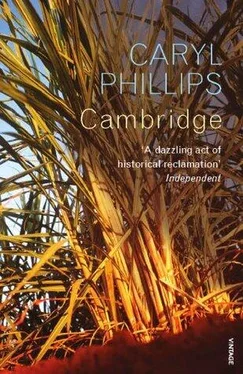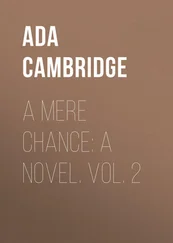Caryl Phillips - Cambridge
Здесь есть возможность читать онлайн «Caryl Phillips - Cambridge» весь текст электронной книги совершенно бесплатно (целиком полную версию без сокращений). В некоторых случаях можно слушать аудио, скачать через торрент в формате fb2 и присутствует краткое содержание. Год выпуска: 2009, Издательство: Vintage Digital, Жанр: Современная проза, на английском языке. Описание произведения, (предисловие) а так же отзывы посетителей доступны на портале библиотеки ЛибКат.
- Название:Cambridge
- Автор:
- Издательство:Vintage Digital
- Жанр:
- Год:2009
- ISBN:нет данных
- Рейтинг книги:5 / 5. Голосов: 1
-
Избранное:Добавить в избранное
- Отзывы:
-
Ваша оценка:
- 100
- 1
- 2
- 3
- 4
- 5
Cambridge: краткое содержание, описание и аннотация
Предлагаем к чтению аннотацию, описание, краткое содержание или предисловие (зависит от того, что написал сам автор книги «Cambridge»). Если вы не нашли необходимую информацию о книге — напишите в комментариях, мы постараемся отыскать её.
Cambridge — читать онлайн бесплатно полную книгу (весь текст) целиком
Ниже представлен текст книги, разбитый по страницам. Система сохранения места последней прочитанной страницы, позволяет с удобством читать онлайн бесплатно книгу «Cambridge», без необходимости каждый раз заново искать на чём Вы остановились. Поставьте закладку, и сможете в любой момент перейти на страницу, на которой закончили чтение.
Интервал:
Закладка:
With Mr Brown I walked the lush pastures of the estate, from time to time being provided the facility to refresh myself with water. The cisterns in which the water for family-use is kept are very well-calculated to preserve the water cool and fresh for some time. What is used for drinking, and supplies the table, passes through a filtering stone into a lead and marble reservoir, which causes it to become more lucid and pure than any water I have ever seen. The reservoir is placed in a shaded corner to preserve the chill, and the water is presented by a slave. The negro offers the water in a coconut shell ornamented with silver, and attached to the end of a hickory handle. This is to prevent the breath of the swarthy bondsman contaminating the purity of the water. Mr Brown was always generous with explanations of any questions I might ask, and ready to label a tree or shrub whose colour or particular grace might attract my eye. However, when I ventured upon more controversial ground, that one might argue is at the heart of the matter, namely slavery, my guide seemed somewhat reluctant to discuss the institution. It would appear that Mr Brown feels that the ethical and moral questions raised by this mode of profit are matters on which I am not yet qualified to engage. Perhaps he objects to discussing such matters with a woman? It is difficult for me to tell. He did, however, suggest that the proposal to substitute animal for black labour arose from pure ignorance. Mr Brown informed me that on many plantations oxen ploughs and other farming implements had been purchased, but through obstinacy and ignorance the negroes simply broke plough after plough and ruined one beast after another. All such attempts have had to be abandoned, for once broken, the cast-iron ploughs cannot be repaired for lack of artisan skills. As for the livestock, efforts to shelter them from heat and rain have proved worthless. Furthermore, the negroes did not seem to understand that the labouring cattle were not as hardy as they, and could not effectively be driven from sun-up to sun-down. Shortly after their arrival the livestock inevitably began to decline, their blood was converted into urine, and expiration soon followed. This, it would appear, constituted the sum total of Mr Brown's case for the continuation of the institution of slavery. In short, if negroes do not labour, then who will? After all, according to my instructor, white men and animals are unsuited to this form of drudgery.
I have spent the greater part of the last few days in thoughtful consideration of the institution. In this frame of mind I have written yet again to Father informing him that upon my return I would wish to make a small lecture tour. A discourse upon my changing fortunes and adventurous travel upon the Atlantic Ocean, and beyond, upon its further shores. This might be of interest to some of the ladies' associations founded by the wives of these new men of industry, especially if my reflections are supported by my immediate experience. When I left these shores I promised Father that I would endure the tropic heat with an open mind as to the merits of the trade in and employment of slaves, and this I have tried to do. But this tired system is lurching towards an end, a fact which it would be foolish to deny. Overworking of the land, absenteeism on the part of those like Father (who fail to recognize that this business of sugar-planting requires the full attention of those who engage in it), the innate menace of this zone, the loss of trade with the newly independent states in America, the afflictions of war in Europe, and, as I observed under the tutelage of Mr Brown, the sad ineffiency of production, all these ills have contributed to the unpropitious future of the West Indian sugar industry. Soon the English must abandon this seeming paradise. Father has connections enough to aid me in a small lecture tour, and I have also suggested that such a tour might help to defer the expense of his sending me upon this journey. I might even compose a short pamphlet framed as a reply to the lobby who, without any knowledge of life in these climes, would seek to have us believe that slavery is nothing more than an abominable evil.
Such untravelled thinkers do not comprehend the base condition of the negro. Nor do they appreciate the helplessness of the white man in his efforts to preserve some scrap of moral decency in the face of so much provocation and temptation. We all hope to welcome the day when liberty shall rule over an ample domain, but at present the white man's unfitness for long toil under the rays of a vertical sun would appear to go some way to justify his colonial employment of negro slaves, whose bodies are better suited to labour in tropical heat. To speak with sentiment merely of the sale and purchase of such people without full consideration of the universal economic facts is plain foolishness. This being the case, I have also informed Father that I shall continue to reside on this plantation for a further three months, during which time I shall have completed the notes for both my pamphlet and my lecture tour. I advised Mr Brown of my decision, to which he merely nodded as though the news were of no consequence to him. After all, I do not believe for one minute that he is under any illusion as to where my loyalties lie: in other words, that is, with my father, his employer and his master. What else could he display but resignation? He was, of course, obliged to remain silent with regard to any fears he might harbour that my writings might comment adversely upon his conduct.
Late last night, having no doubt been informed by Stella of my extended residence, the negroes took it into their heads to pay me a compliment of an extremely inconvenient nature. In order to display their pleasure at my continued sojourn among them, they thought it proper to treat me to a nocturnal serenade. Accordingly, a large body of well-dressed negroes arrived under my window about midnight, accompanied by drums, rattles, and a full orchestra of such unlikely instruments. Thereafter, there appeared to me a congregation of black limbs tumbling and leaping and seemingly determined to pass the whole night singing and dancing beneath my balcony. From their lungs bellowed forth stentorian snatches of Bacchanalian songs, and their unseemly laughter disturbed the still night air. Their fiddlers, cognizant of neither sharps nor flats, embraced with enthusiasm their old friend discord, while those who danced were unable to prolong their individual exertions above a minute or two; nevertheless, this sufficed to distil an abundance of perspiration. Such a vulgar, yet dextrous, set of antics never came into the brain, or out of the limbs, of anything but a son of Ham enjoying his jubilee. After an hour of this Dionysiac abomination, I instructed Stella to inform them that I had long since retired and that they should withdraw promptly to their village. This she did, and then presented herself once more, whereupon she began to address me, her countenance displaying a degree of concern which approached severity.
Dear Stella. Things between us have not been easy of late. I suspect that she is a shade jealous of the attention that Mr Brown has recently bestowed upon me. I suspect also that he has exchanged fewer words with her than was the case before my arrival. Jealousy being the transitory emotion that it is, I am sure that this difficulty will soon pass, and before long a familiar sweet smile will once more be embellishing her features so that despite their dusky tint they might reassume the appearances of both gentleness and refinement. There has been no sign of Christiania for some while, and Stella and I are once again the dominant females of the household. Dear Stella, she seemed delighted to hear that I would be prolonging my visit, and I am sure that the emotions she displayed were no mere show of theatrical skill. We two sat together until all the negroes had ceased their noisy revelry and returned to their lairs and nests. What we in England call autumn is now upon us. Stella, seemingly both exhausted and preoccupied with her own cogitations, informed me that we were entering the time of the rainy season, with its occasional hurricane. Then she closed her eyes.
Читать дальшеИнтервал:
Закладка:
Похожие книги на «Cambridge»
Представляем Вашему вниманию похожие книги на «Cambridge» списком для выбора. Мы отобрали схожую по названию и смыслу литературу в надежде предоставить читателям больше вариантов отыскать новые, интересные, ещё непрочитанные произведения.
Обсуждение, отзывы о книге «Cambridge» и просто собственные мнения читателей. Оставьте ваши комментарии, напишите, что Вы думаете о произведении, его смысле или главных героях. Укажите что конкретно понравилось, а что нет, и почему Вы так считаете.












